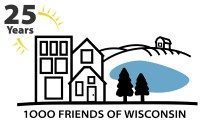Land Use Planning & Natural Resources Protection
1000 Friends of Wisconsin was founded in 1996 in order to become the citizens’ voice for sound land use planning. The goal was to protect Wisconsin’s quality of life, natural resources and cultural heritage from the effects of sprawl and uncontrolled growth.
We spearheaded the successful effort to pass Wisconsin’s Comprehensive Planning Law – ensuring that communities across the state would be required to enlist their residents in an open, comprehensive planning process that would lead to informed choices about where and when future growth would take place.
Gone were the days of “developer’s choice”. Plans would have to address land use impacts related to transportation choices, housing, utilities, economic development, agriculture, natural resources and intergovernmental concerns.
If a land use decision is not consistent with the plan, either the land use decision is not allowed – or the plan must be amended. We continue to support this important law today.

Comprehensive Planning
Prior to 2010, Wisconsin had no statewide plan for land use and we were all paying the price.
Scattered development was leading to unchecked sprawl resulting in millions of acres of farmland being developed, forests being fragmented and prairies and wetlands being lost.
All of these development pressures were endangering our wildlife, polluting our air and threatening our way of life.
In order to reign in this unchecked sprawl, 1000 Friends of Wisconsin led the effort to pass Wisconsin’s Comprehensive Planning Legislation (or Smart Growth Law) ensuring that communities across the state would be required to enlist their residents in an open, comprehensive planning process that would lead to informed choices about where and when future growth would take place. Learn more.
Transportation and Land Use
A disproportionate focus on cars has led to sprawl and unsustainable land use patterns.
An effective and balanced transportation system that combines multiple methods of travel, including automobiles, public transit, bicycles and pedestrian walkways must be achieved in order to keep our communities compact and protect our natural resources. Learn more about our transportation work.
Read our series: The Transportation Connection to learn about the relationship between transportation and land use.
Watershed Protection through Green Infrastructure
1000 Friends partnered with community members throughout Wisconsin to plan for and implement green infrastructure solutions with emphases on watershed protection, community involvement and environmental education.
We coordinated the Leopold Green Schoolyard program where we engaged staff, parents, kids and community partners in using green infrastructure to address flooding issues and helped the school develop spaces for outdoor environmental education and creative play.
Our urban forestry program provided crucial green infrastructure tools for reducing storm-water runoff by expanding urban canopies in key places in communities across Wisconsin. The urban trees help reduce pollutant and sediment loading into Lake Michigan and Lake Superior by mitigating erosion and increasing nutrient infiltration. Learn more.
Working Lands
1000 Friends was a key partner in the development of Wisconsin’s Working Lands Initiative, with the goal of preserving farmland for future generations. Learn more.
